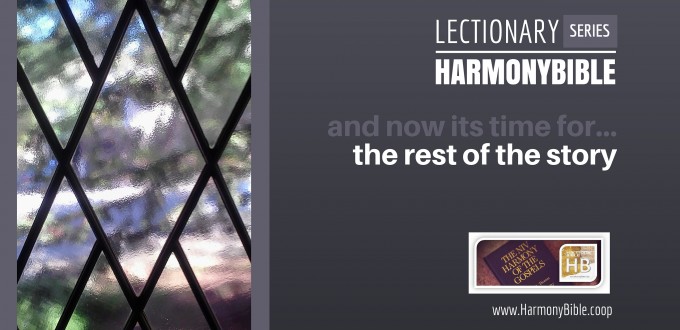Today’s Gospel reading falls within Sections 122 and 123 of the Harmony of the Gospels. The curious worshiper will undoubtedly be wonder, ‘what happened in verse 1’ after hearing today’s Gospel. It provides a setting and context which should not be overlooked.
[one_half last=”no”]Matthew 19:1-2
1 When Jesus had finished these words, he departed from Galilee, and came into the borders of Judea beyond the Jordan. 2 Great multitudes followed him, and he healed them there. [/one_half]
[one_half last=”yes”]Mark 10:1
1 He arose from there and came into the borders of Judea and beyond the Jordan. Multitudes came together to him again. As he usually did, he was again teaching them.[/one_half]
 Jesus was on his final journey to Jerusalem 1. He had already spent about three years with his Apostles and is just days away from his triumphal entry in Bethany (section 128a, and the Holy Week mini-series) near the time of the Jewish Passover. The Pharisees were bent to undermining Jesus and protecting what they “knew and wanted” to be the truth. With such devotion, they were known for placing a higher value on the concessions for divorce given in Deut 24:1-4 than the sacrament of marriage in Gen 2:24. 2
Jesus was on his final journey to Jerusalem 1. He had already spent about three years with his Apostles and is just days away from his triumphal entry in Bethany (section 128a, and the Holy Week mini-series) near the time of the Jewish Passover. The Pharisees were bent to undermining Jesus and protecting what they “knew and wanted” to be the truth. With such devotion, they were known for placing a higher value on the concessions for divorce given in Deut 24:1-4 than the sacrament of marriage in Gen 2:24. 2
[one_third last=”no”]Matthew 19:3-15
3 Pharisees came to him, testing him, and saying, “Is it lawful for a man to divorce his wife for any reason?”
4 He answered, “Haven’t you read that he who made them from the beginning made them male and female, 5 and said, ‘For this cause a man shall leave his father and mother, and shall be joined to his wife; and the two shall become one flesh?’ 6 So that they are no more two, but one flesh. What therefore God has joined together, don’t let man tear apart.” 7 They asked him, “Why then did Moses command us to give her a certificate of divorce, and divorce her?” 8 He said to them, “Moses, because of the hardness of your hearts, allowed you to divorce your wives, but from the beginning it has not been so. 9 I tell you that whoever divorces his wife, except for sexual immorality, and marries another, commits adultery; and he who marries her when she is divorced commits adultery.” 10 His disciples said to him, “If this is the case of the man with his wife, it is not expedient to marry.” 11 But he said to them, “Not all men can receive this saying, but those to whom it is given. 12 For there are eunuchs who were born that way from their mother’s womb, and there are eunuchs who were made eunuchs by men; and there are eunuchs who made themselves eunuchs for the Kingdom of Heaven’s sake. He who is able to receive it, let him receive it.” 13 Then little children were brought to him, that he should lay his hands on them and pray; and the disciples rebuked them. 14 But Jesus said, “Allow the little children, and don’t forbid them to come to me; for the Kingdom of Heaven belongs to ones like these.”
15 He laid his hands on them, and departed from there. [/one_third]
[one_third last=”no”]Mark 10:2-16
2 Pharisees came to him testing him,3 and asked him, “Is it lawful for a man to divorce his wife?” 3 He answered, “What did Moses command you?”4 4 They said, “Moses allowed a certificate of divorce to be written, and to divorce her.”5 5 But Jesus said to them, “For your hardness of heart,6 he wrote you this commandment. 6 But from the beginning of the creation, God made them male and female.7 7 For this cause a man will leave his father and mother, and will join to his wife, 8 and the two will become one flesh, so that they are no longer two, but one flesh. 9 What therefore God has joined together, let no man separate.” 10 In the house, his disciples asked him again about the same matter.
11 He said to them, “Whoever divorces his wife, and marries another, commits adultery against her. 12 If a woman herself divorces her husband, and marries another, she commits adultery.”
13 They were bringing to him little children, that he should touch them, but the disciples rebuked those who were bringing them.8 14 But when Jesus saw it, he was moved with indignation, and said to them, “Allow the little children to come to me! Don’t forbid them, for God’s Kingdom belongs to such as these. 15 Most certainly I tell you, whoever will not receive God’s Kingdom like a little child, he will in no way enter into it.”9 16 He took them in his arms, and blessed them, laying his hands on them.[/one_third]
[one_third last=”yes”]Luke 18:15-17
15 They were also bringing their babies to him, that he might touch them. But when the disciples saw it, they rebuked them. 16 Jesus summoned them, saying, “Allow the little children to come to me, and don’t hinder them, for God’s Kingdom belongs to such as these. 17 Most certainly, I tell you, whoever doesn’t receive God’s Kingdom like a little child, he will in no way enter into it.”10[/one_third]
Group Dialog
- How do the words in today’s epistle reading from Hebrews resonate with Jesus response to the Pharisees about divorce and welcoming the little children, and all types of people with the sweetest forms of faith, hope, and love?
- Read Genesis 2:18-24 and consider how the need for a partner, a spouse, a lover, has influenced your decisions, actions and thoughts. How might you work to strengthen your relationship or matrimony today?
- How has the grace you have received and patience of the Lord, inspire you to love your spouse (and others)?
- Read and talk about this quote from C.S. Lewis:
“To love at all is to be vulnerable. Love anything and your heart will be wrung and possibly broken. If you want to make sure of keeping it intact you must give it to no one, not even an animal. Wrap it carefully round with hobbies and little luxuries; avoid all entanglements. Lock it up safe in the casket or coffin of your selfishness. But in that casket, safe, dark, motionless, airless, it will change. It will not be broken; it will become unbreakable, impenetrable, irredeemable. To love is to be vulnerable.” ― C.S. Lewis, The Four Loves - The pharisees desired to end Jesus’ ministry, and the disciples tried to prevent the children from coming to Jesus; In what ways have you seen people (or yourself) try to prevent (blockade, regulate, hinder, impede, hamper, obstruct, balk, foil, thwart, forestall, counteract, inhibit, curb, restrain, preclude, preempt; disallow, prohibit, forbid, proscribe, exclude, debar, bar) people from coming to Jesus, maturing in the faith so that they may help fulfill the great commission and aid in the ministry of reconciliation?
- Read and discuss the psalm for today and talk about the meaning, significance, and resultant behavior that this phrase “redeem me, O LORD, and have pity on me” (Ps 26:11b) evokes in your heart, your life, and interaction with others.
- Talk with one another openly about how you can rid yourselves of all malice, and collaborate with one another to further the kingdom of God. (1Pt 2:1; Eph 4:31; Jms 4:11; 1Pt 3:10; Jms 5:9; Heb 12:1; Tit 3:3-5)
Study Notes:
- See the Harmony Bible Map
- Divorce was permitted but only in accordance with the Mosaic law (Deut 24:1-4). After coming out of Egypt the Jews were instructed (Ezra 10:11-19) to forsake the Gentile women they had married contrary to the law. In today’s reading we hear Jesus pointedly clarifying that divorce, while permitted, is due to the weakness of spirit and hardness of heart. Christ’s other teachings and conversations on divorce can be read in these three sections: Section 122 Matt 19:1-12/Mark 10:1-12; Section 54e Matt 5:21-48/6:27-30,32-36, and Section 117b Luke 16:18).
- They had been trying for some time to ensnare Jesus, see also John 8:6; John 11:47 and Luke 11:53-54.
- Jesus was not preaching or ushering in a kingdom of law (nor lawlessness) but a kingdom grace, power, and love. Read also John 5:39; Galatians 4:21; 2Tim 1:7.
- They referenced Deut 24:1-4, but there are other Old Testament passages that address the topic in different times and circumstances: Exodus 21:7-11 ; Deuteronomy 21:10-14 ; 24:1-4 ; Ezra 10:1-16 ; Nehemiah 13:23-30 ; Jeremiah 3:1 ; Micah 2:9 ; Malachi 2:14-16. Jesus’ comments and teachings can be seen listed in footnote no.2. Paul offers us this most prominent instruction about divorce is found in 1Cor 7:10-11, and marriage in Eph 5:22-33.
- They (and all to often we ourselves) were said to be a stiff-necked people, stubborn, prideful, and unrepentant. Read Deut 9:6; Deut 31:27; Neh 9:16-17,26; Acts 7:51.
- Read Genesis Gen 1:27; Gen 5:2.
- Not unlike the Pharisees had been doing. Read Matthew 23:13
- This is not the first time Jesus has told them this. The previous account in Section 90 Matt 18:1-5/Mark 9:33-37/Luke 9:46-48 which was quite similar had taken place just prior to the Feast of Tabernacles (section 93) in the month called Tishrei (which usually occurs in September–October). As our chronology follows, in Section 128a Jesus was headed for Jerusalem for the Passover Feast (Nisan 14-15 which usually falls in March–April), Therefore Jesus had told them this at least once before about six months prior. The events are very similar: dispute over the law, pride, rivalry, and Jesus’ stern warning against impeding others.
- Like little children (1 Peter 2:1-3; Hebrews 5:12-13; 1 Corinthians 3:1-2) or more mature believers (Rom 15:1-8; 2Tim 1:6-15) let us consider together how we can obey the command in Eph 4:12-13 rather than giving room for vanity, pride, and rivalry. (See also: 2 Peter 3:18; 1 Corinthians 14:20; Hebrews 6:1).
